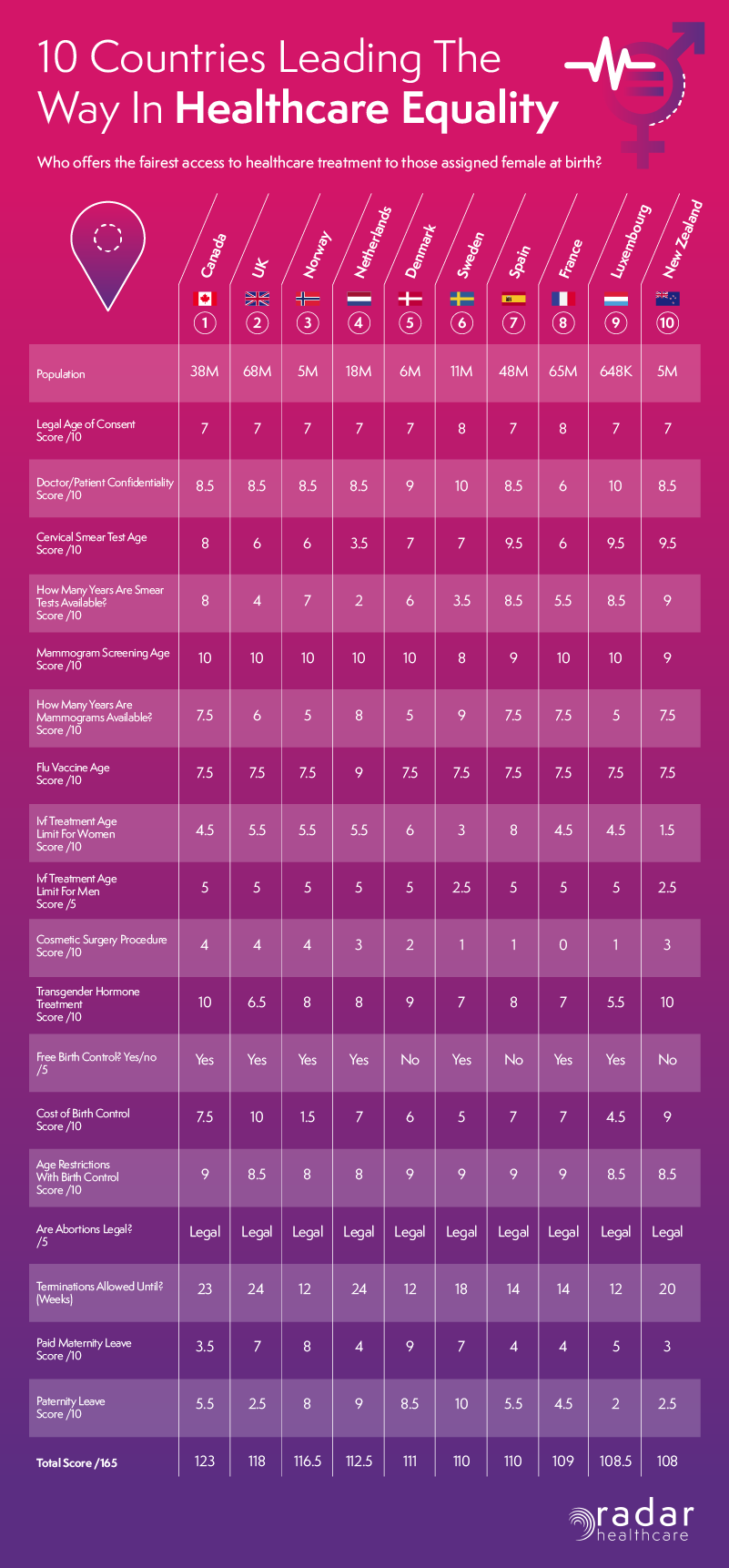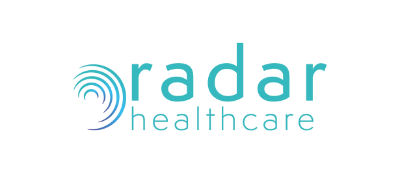Which are the Top 3 Ranking Countries for Healthcare Equality?
05 July 2023
Tags:
Global Healthcare Inequalities in Numbers:
Which are the Top 3 Ranking Countries for Healthcare Equality?
As part of our “Global Healthcare Inequalities in Numbers” research, we evaluated healthcare systems worldwide to identify those providing the fairest patient equality based on laws and regulations.
Our report determined the countries that provided the best healthcare when it came to equality for all.
Take a look at our infographic below for an instant snapshot of the highest ranking countries for healthcare equality based on various factors:

Healthcare Equality Report: Canada Leads with Impressive Scores in Consent and Confidentiality
In first place was Canada, with a population of 38.4 million people. Canada’s age of consent is 16, which also happens to be the age of doctor and patient confidentiality. Each category received an equality score out of 10, meaning each territory was assigned an overall mark out of possible 165.
Canada received 7/10 when it came to the age of consent, and an impressive 8.5/10 for doctor/patient confidentiality, achieving 123/165 overall.
Interestingly, the countries in second and third place – the UK and Norway – both scored the same marks across these two categories.
This highlights the effectiveness of allowing those in a younger age demographic autonomy over their bodies, and the ability to make decisions for themselves when it comes to requesting or refusing treatment.
Those living in the country of Malta, where the age of consent is 18, have to wait a full two years after some of their European peers to be afforded the same rights, contributing to Malta ranking in 29th place overall.
Comparing Cervical Screening Age Policies: Canada, UK, and Norway
When it came to analysing the age where females are offered cervical screening appointments, Canada blew the UK and Norway out of the water. The North American country offers the test (often referred to as ‘smear tests’) from those aged 21, scoring 8/10 in the category. Current regulations stipulate residents of the UK and Norway are screened for cervical abnormalities from the age 25 and onwards, scoring 6/10.
A recent petition that failed to receive enough signatures, attempted to lower the age of cervical screenings in the UK, reinforcing the important message that they help to detect human papillomavirus (HPV) which, if left diagnosed, can mutate into cancer. This virus is extremely common in much younger women, highlighting the importance of implementing testing as soon as possible.

One notable example of cervical cancer in a high profile individual making national headlines, and resulting in a significant increase of UK women keeping on top of their smear appointments, was that of British reality TV star Jade Goody.
Ms Goody – who found nationwide fame appearing on the UK version of Big Brother and her own subsequent TV shows – was diagnosed with cervical cancer aged just 27. She sadly died just seven months after her initial diagnosis after learning the cancer had spread to her bowel, liver, and groin. Following her death in 2009, the number of women attending cervical screenings in the UK rose by half a million, dubbed by the press as “the Jade Goody effect”.
Mammogram Guidelines: Top Countries Maintain Consistency in Screening Age
Interestingly, the age range of when mammograms are recommended across the top three ranking countries all scored 10/10. Both Canada, The UK, and Norway all recommend women begin mammograms from the age of 50, which is when the NHS website states that individuals have the highest chances of developing breast cancer.
Official NHS guidance states that those yet to reach menopause have denser breast tissue, making typical breast screening processess less effective for younger individuals.
Overall, the top three countries in the list proved to be very deserving of their high scores.

What Do Our Experts Have to Say on the Subject?
Hayley Levene, Head of Marketing at Radar Healthcare, discusses how technology and data can help with decision making:
“Radar Healthcare partners with organisations such as Public Policy Projects who are learning from experience (both their own and others) to make contributions to the policy debate which address real-world choices on the basis of real-world evidence.
“As a healthcare supplier, Radar Healthcare is passionate about helping to make a difference and delivering improved outcomes. Working with PPP to produce reports such as ‘The Social Care Workforce: averting a crisis’, ‘The Digital Divide: reducing inequalities for better health’ and ‘Integrating Health and Social Care: a national care service’ is vital in helping to drive change and improve some of these health inequalities.
“For example, technology could offer oversight that 80% of patients or healthcare workers themselves are having suicidal thoughts – and this could prompt a process to be followed to tackle it, which will encourage decisions of change.”
The Health Inequalities Report by the experts at Radar Healthcare discovers which of the world’s most developed countries offer the best healthcare in regards to a wide range of healthcare rights for citizens through their regulations and laws.
Taking a seed list of the top 35 most developed countries around the world, the report reveals the laws relating to the following in order to assess the biggest areas of inequality across different territories and how it impacts those of different genders, age groups, financial and sociological status, parenthood, surgery, birth control, and abortions:
- The legal age of consent – the age at which a person is considered to be legally competent to consent to sexual acts
- Doctor / patient confidentiality ages – the age a resident can speak confidentiality to a healthcare professional without parents/guardians being informed
- Cervical cancer screening – what age are they recommended for women around the world
- Mammogram screening tests – what age are they recommended for women
- Flu vaccines – at what age is this offered to elderly residents around the globe
- IVF treatment age range – how does your age impact your chances of becoming a parent via in-vitro in different countries around the world
- Cosmetic surgery – at what ages can someone have a cosmetic surgery procedure
- Transgender hormone treatment – at what age do healthcare practitioners in different countries allow transgender patients to start hormone treatment
- Access to birth control around the world – (age requirements/costs/the countries offering free birth control)
- Abortion laws – how do they differ across the world
- Maternity leave laws – How much maternity leave are new mothers legally entitled to both paid and unpaid
- Paternity Leave – Parental right for working fathers/partners around the world







